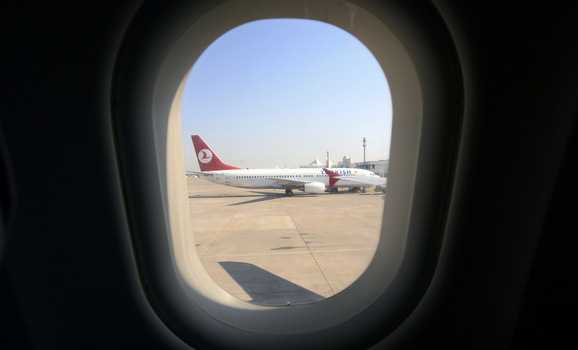A beautiful woman with long, curly hair, blowing gently in the breeze, stares mournfully at the blue sky, tears rolling down her cheeks; a stubble-jawed hunk, his own blonde locks swept back behind his ears by a solid plastering of hair gel and a pair of dark sunglasses, stands behind the woman, smouldering silently; and from Trabzon to the West Bank to Astana, crowds gather around television sets in cafes and living rooms to catch the latest episode in one of Turkey’s extremely popular soap operas. This is the modern face of Turkish soft power, which has grown to reflect Ankara’s steadily increasing role as a modern regional pole, rather than the appendage to the West that Turkey has sometimes seen since the days of Ottoman decline.
This rise in Ankara’s influence means that even predictable political events – like the parliamentary elections of 12 June – matter. The ruling Justice and Development Party (AKP) is on its way to a third consecutive term in office. But this vote is not about business as usual, and the result will leave its imprint on the political model Turkey is heading towards. It will certainly raise important questions about Turkish neighborhood policy, and that means that it will also raise important strategic questions for the EU.
Turkey’s aspirations towards regional hegemony have a solid economic foundation. Ankara’s policies are designed to serve commercial and security interestsacross a neighbourhood that spans the erstwhile territories of the Ottoman Empire and beyond.Economic links with Russia are thriving. Turkish traders and investors are now a familiar sight even in sub-Saharan Africa. And wherever there is a television, steamy soap operas are quietly building up that Turkish soft power.
This burgeoning influence means that Turkey seems to have overtaken the EU in the race to exert ‘transformational power’. As Europe upgrades its Schengen walls, Turkey’s neighbours travel en masse for business and leisure to Istanbul or the alluring sea resorts. This human contact also helps spread ideas, and the Arab Spring has given currency to the talk of Turkey as a democratic model for countries in the Middle East and North Africa. As ECFR’s latest report “What Does Turkey Think?” argues, Europe needs to follow this new Turkey closely.
Turkey’s recent economic success is striking. With the EU struggling to stabilise the eurozone, the Turkish economy can point to 9% growth in 2010 (per capita GDP has risen from $6,000 to $14,243 in a decade) and a steady rise up the value-added ladder. Although this success owes much to the (now stalled) EU accession process, thanks to the 1996 Customs Union, there is a justifiable sense of schadenfreude in Ankara. Europe may now be reluctant to have Turkey as a full EU member, but perhaps it needs Turkey more than the other way around.
Just like in Turkish soap operas, however, there is no certainty that good times continue, and that is why these elections – however predictable – are so important.
Firstly, the new Grand National Assembly will shoulder the difficult task of drafting a new constitution. “What Does Turkey Think?” shows there are competing, often deeply opposed views. AKP and its liberal supporters maintain that the new basic law will strengthen democratic reform, entrench human rights and solve the Kurdish issue. By contrast, secularist critics see the spectre of Putin-style presidentialism and a fallback to authoritarianism (this time tinged by religious conservativism). It is clear that an inclusive political process with all voices represented (pro-AKP, Kemalists, liberal democrats, Kurds) is necessary to legitimise any new constitution.
Secondly, a new AKP government has to continue its pro-growth policies while addressing immediate concerns such as the current account deficit and the threat of growing inflation. Basking in its own glory, it should not lose sight of structural challenges to do with the labour market, savings rates, skills and education, and welfare provision. The CHP has been campaigning extensively on such issues, which is likely to pay off at the ballot box.
Turkey’s democratic and economic achievements are the pillars of its neighbourhood policy, but the Turkish example is not without its blindspots. It is a challenge for Ankara to preach conflict resolution in neighbouring countries while the Kurdish issue remains unresolved, and there is tension in the southeast. Criticisms over freedom of expression should also be taken seriously if Turkey should serve as a source of inspiration for the new Middle East. A return to the boom-and-bust cycles of the pre-2002 period would tarnish Turkey’s reputation of an economic powerhouse.
All these concerns highlight the continued importance of the EU. Between 1999 and 2006, the golden period in the EU-Turkey saga, Brussels provided the much needed external push towards democratisation. Without the EU, Turkey may lack sufficient internal capacity to resist the authoritarian temptation. Even if a backslide is improbable, Brussels could accelerate positive change and keep the AKP focused on liberal reform. The EU is the origin of 80% of FDI and by far Turkey’s biggest trading partner. Turkey needs European pressure if it is to grow, develop and remain competitive.
This does not make the EU indispensible, and Turkey does not fear a continuation of the status quo. The accession negotiations will not be called off, but Ankara will continue to pursue economic and diplomatic relations with its neighbourswith vigour and confidence. Sadly, interdependence does not rule out conflict: continued accession deadlock may inject a hefty dose of antagonism into the relationship. Competitive friction already exists in places like Bosnia (playing for far lower stakes than, for instance, in Iran). To make interdependence work, the EU needs to engage the new Turkey, and that means paying close attention to the forthcoming elections, no matter how predictable they may seem.
This piece also appears on EUobserver


Leave a Reply